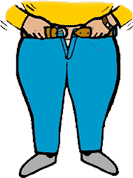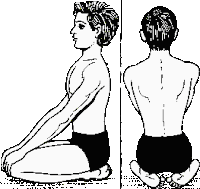Hello everyone.....Let's start with my Day1 yoga .
Today I will introduce some 'asanas' which can be done at any time.
Sitting ideal in front of a TV or computer really makes you to put on flab.
You needn't do a lot of exercise to decrease the flab , you can relax in one of the following poses illustrated below even while watching TV. These 'asanas' can be done at any time.There are no restrictions or time limit for this 'asanas'.
Vajrasana:
It is also known as 'Thunderbolt Pose' or 'Diamond Pose'.
Procedure:
1.Sit stretching both the legs.
Benefits:
Today I will introduce some 'asanas' which can be done at any time.
Sitting ideal in front of a TV or computer really makes you to put on flab.
You needn't do a lot of exercise to decrease the flab , you can relax in one of the following poses illustrated below even while watching TV. These 'asanas' can be done at any time.There are no restrictions or time limit for this 'asanas'.
Vajrasana:
It is also known as 'Thunderbolt Pose' or 'Diamond Pose'.
Procedure:
1.Sit stretching both the legs.
2.First fold the left leg and then fold the right leg.
3.The practitioner should sit on the heels and place the palms on the knees.
4.The Spine should be erect and breath should be deep.
Benefits:
1.Vajrasana is said to be effective against knee pain, rheumatism in the legs, blood pressure.
2.It helps in developing healthy mind and body.
3.Vajrasana is said to be effective against fat in the regions of shanks, calves, thighs and buttocks.
4.The practice of this yoga will help you in increasing focus and concentration.
5.This yoga helps cure urinal disorders.
6.This is the only asana which can be done after eating food also.It will digest food easily.
Padmasana:
It is also known as 'Lotus pose' and 'Classic pose'.
Procedure:
1.Sit on the floor or on a mat.
2.Bend your left knee as if you were sitting in a regular cross legged position.
3.Bring your lower right leg to your upper left leg.
4.Leaning back slightly, lift your lower left leg over your right shin. Rest your lower left leg on your upper right leg. You may need to reposition your lower legs slightly with your hands.
5.Let the tips of the thumbs of both the hands touch the tips of the index fingers.
1.Relaxes the body and mind and prepares for 'Padmasana' and other asanas which are based on padmasana.
2.It also improves digestion and helps in concentration and relaxation of mind.
3.This pose is very suitable for mediation.
4.Leaning back slightly, lift your lower left leg over your right shin. Rest your lower left leg on your upper right leg. You may need to reposition your lower legs slightly with your hands.
5.Let the tips of the thumbs of both the hands touch the tips of the index fingers.
6.Stay in the final position for one or two minutes in the initial stage. Later gradually increase the time.
Benefits:
1. Opens up the hips.
2.Stretches the ankles and knees.
3.Calms the brain.
3.Calms the brain.
4.Increases awareness and attentiveness.
5.Keeps the spine straight.
5.Keeps the spine straight.
6.Helps develop good posture.
7.Eases menstrual discomfort and sciatica.
7.Eases menstrual discomfort and sciatica.
8.Helps keeps joints and ligaments flexible.
9.Stimulates the spine, pelvis, abdomen, and bladder.
10.Restores energy levels.
Note: Initially it is very difficult to sit in this pose.So try doing 'Ardha padmasana'. Slowly practise
Ardha Padmasana:It is also called 'Half Lotus Pose'
Benefits:
Procedure:
1.Sit stretching both the legs
2.First fold the left leg to the upper right leg.
3.sit for some time in this pose.
4.Now remove this pose and fold the right leg on the upper left leg.
5.Sit for some time in this position.
1.Relaxes the body and mind and prepares for 'Padmasana' and other asanas which are based on padmasana.
2.It also improves digestion and helps in concentration and relaxation of mind.
3.This pose is very suitable for mediation.
Savasana:
It is also called 'Corpse Porse'.
Procedure:
1.Come to lie down on the back.
2.Let the feet fall out to either side.
3.Bring the arms alongside the body, but slightly separated from the body, and turn the palms to face upwards.
4. Relax the whole body, including the face. Let the body feel heavy.
5.Let the breath occur naturally.
6.To come out, first begin to the deepen the breath. Then move the fingers and toes, awakening the body.
7.Bring the knees into the chest and roll over to one side, keep the eyes closed.
8.Slowly bring yourself back up into a sitting position.
9.Lie on the right side before coming up from this position.
Quick Tip:
 Lying on the right side is preferable before getting up from asanas or sleep?Why not left?
Lying on the right side is preferable before getting up from asanas or sleep?Why not left?
2.Let the feet fall out to either side.
3.Bring the arms alongside the body, but slightly separated from the body, and turn the palms to face upwards.
4. Relax the whole body, including the face. Let the body feel heavy.
5.Let the breath occur naturally.
6.To come out, first begin to the deepen the breath. Then move the fingers and toes, awakening the body.
7.Bring the knees into the chest and roll over to one side, keep the eyes closed.
8.Slowly bring yourself back up into a sitting position.
9.Lie on the right side before coming up from this position.
No
yoga session is complete without the final pose – Savasana. The body
needs this time to understand the new information it has received
through practicing yoga. Even though Savasana is a resting pose, it’s
not the same a sleeping! You should stay present and aware during the
five to ten minute duration of final relaxation.
If u feel tired or stressed after doing any asana then do corpse pose for some time then the body will come into normal condition.
Quick Tip:
1.Your heart is on your left side. When you roll to your right, your
heart is above the organs on your right side, it's less weight on the
heart. It's not that big of a deal, but if you rolled to your left, the
heart would have a bit more pressure on it.
2. You roll to your right side because you want to cool down and
remain calm when you come up to a seated position.





No comments:
Post a Comment